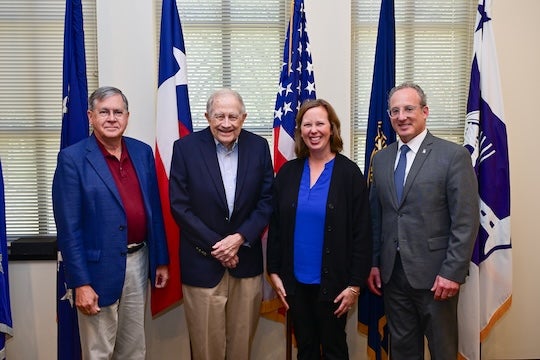In a heartfelt gesture of philanthropy and tribute, Rice University’s Neal Lane and the Lane family have donated $200,000 to Rice’s Baker Institute for Public Policy to establish the Joni Sue Lane Rice University Lecture on Women in Science and Technology, named for his wife, who was a longtime staff member in the university’s computer center.

The endowment aims to recognize and amplify the vital contributions of women in science, technology, engineering and mathematics. Moreover, as the endowment grows, it will support events and activities at the Baker Institute to serve as a platform for researchers, policymakers and industry leaders to share insights and foster discussions that can shape future developments in science and technology.
“This is a way to support the Baker Institute Science and Technology Policy Program directed by Kirstin Matthews, whom I am privileged to work with, and to give back to Rice, an institution Joni and I have loved since we arrived in 1966,” said Lane, the Malcolm Gillis University Professor Emeritus, professor emeritus of physics and astronomy and a senior fellow in science and technology policy at the Baker Institute.
The donation is also a tribute to Houston and Lane’s wife. “Houston has been our hometown for most of our lives, and it is where we raised our children,” he said. “Most importantly, this endowment honors my wife, Joni, who is currently in hospice care suffering from dementia, as well as all women in science and technology.”
Baker Institute Director David Satterfield expressed his gratitude for the Lane family’s contribution. “This endowment celebrates the contributions of women in science and technology and their impact on public policy,” Satterfield said. “We are deeply honored by Neal Lane’s generous gift and the legacy it will create.”
Lane is widely recognized for his contributions to both academia and public service. A distinguished physicist, he has been a leader at Rice for decades, beginning his career at the university as an assistant professor in 1966. Lane later served as provost before assuming national roles, including director of the National Science Foundation and the White House’s Office of Science and Technology Policy under former President Bill Clinton. His extensive career in science and public policy has earned him numerous accolades, including the Vannevar Bush Award and the National Academy of Sciences’ Public Welfare Medal.
Throughout his tenure, Lane has remained committed to fostering diversity and inclusion in science, a dedication he shares with his wife. A talented mathematician, Joni Lane demonstrated her passion for computing early on, leading a programming group at the Federal Aviation Administration. At Rice, she worked as a systems programmer, playing a vital role in developing the university’s early computing capabilities. Over nearly two decades, Joni supported students and faculty in their computing needs, contributing to the growth of Rice’s Institute for Computer Services and Applications.
“Dr. Lane’'s gift is a phenomenal tribute to his wife’'s accomplishments at Rice, and we greatly appreciate his generosity,” said Stephen Bayer, Rice’s vice president for development and alumni relations.
The couple’s partnership in life and academia is rooted in a shared love of learning and science as well as love for each other and their family. Their journey began in Oklahoma City, where they met in high school and later attended the University of Oklahoma together. While Neal pursued degrees in physics, Joni pursued mathematics, helping him along the way and igniting her passion for computer programming. Her career and contributions at Rice mirrored her dedication to advancing technology and supporting others in their educational endeavors.
“Joni was ahead of her time,” Neal said. “She was not a computer scientist; the field was in its infancy. She wrote computer programs and helped others, including students, faculty and staff, with theirs. Helping people was her joy.”
Her work at Rice was invaluable to many, including many of his students and postdocs, Neal said. “Her story — and the stories of countless other women — deserve to be recognized.”

